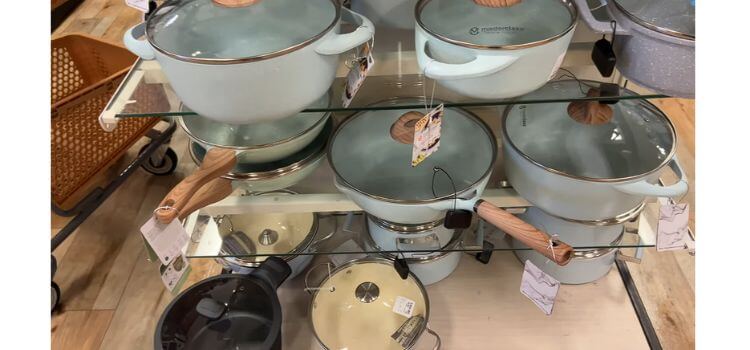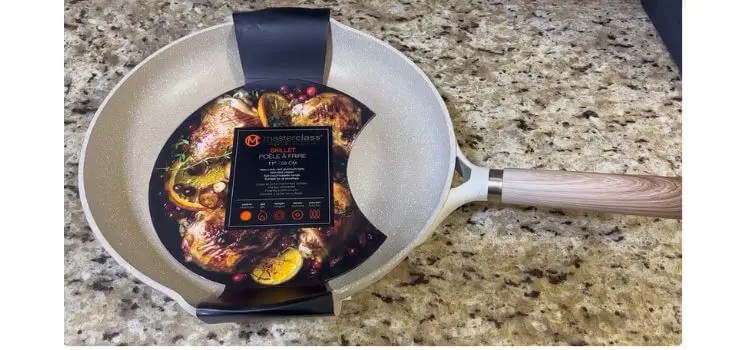
When it comes to high-quality cookware, MasterClass is a name that stands out in many kitchens. Known for its durability and excellent cooking performance, this cookware is a favorite among both home cooks and professionals.
But before you start using it for all your favorite recipes, it’s essential to understand whether MasterClass cookware is safe to use in the oven.
Knowing the oven compatibility of your cookware can make a big difference in your cooking experience, helping you avoid any potential damage and ensuring that your meals turn out just right.
In this article, we’ll explore whether MasterClass cookware can go in the oven and what you need to know to use it safely.
What Is MasterClass Cookware Made Of?
MasterClass cookware is made from a variety of high-quality materials designed to provide excellent cooking results. The most common materials used in their cookware include:
Stainless Steel: Many MasterClass pots and pans are made from stainless steel. This material is popular because it’s strong, resistant to rust, and doesn’t react with food. Stainless steel is generally safe for oven use, but it’s important to check the specific temperature limit provided by the manufacturer.
Non-Stick Coatings: Some MasterClass cookware features a non-stick coating, which makes cooking and cleaning easier. The non-stick surface is often made from materials like PTFE (commonly known as Teflon). While non-stick pans are convenient, they have temperature limits. Using them in the oven at too high a temperature can damage the coating and release harmful fumes.
Aluminum: Aluminum is another material found in some MasterClass cookware. It’s lightweight and heats up quickly, making it great for even cooking. However, pure aluminum is often paired with other materials, like stainless steel, to improve its strength and make it suitable for oven use.
Cast Iron: Some specialized pieces of MasterClass cookware are made from cast iron. Cast iron is prized for its excellent heat retention and even cooking capabilities. This material is highly durable and can handle high oven temperatures, making it perfect for dishes that start on the stovetop and finish in the oven.
Is MasterClass Cookware Oven Safe?
Yes, most MasterClass cookware is oven safe, but it’s important to know the specific details for each type of cookware. Generally, MasterClass cookware made from stainless steel or cast iron can handle high oven temperatures, making it suitable for a wide range of cooking tasks.
However, there are some important things to consider depending on the type of cookware you have.
Temperature Limits for Different Types of MasterClass Cookware
- Stainless Steel Cookware: MasterClass stainless steel pots and pans are usually safe to use in the oven up to around 500°F (260°C). This makes them perfect for roasting, baking, and even broiling. Just be sure to check if the handles are also stainless steel, as some handles might have a lower heat tolerance.
- Non-Stick Cookware: If your MasterClass cookware has a non-stick coating, it is generally oven safe, but only up to a lower temperature, typically around 350°F to 400°F (175°C to 200°C). Exceeding this limit can damage the non-stick coating, so it’s important to follow the manufacturer’s recommendations.
- Cast Iron Cookware: MasterClass cast iron pieces are highly durable and can usually be used in the oven at very high temperatures, often up to 500°F (260°C) or more. This makes them perfect for dishes that need to be cooked both on the stovetop and in the oven.
- Cookware with Plastic Handles: If your cookware has plastic handles, it may not be safe for oven use, or it might have a lower temperature limit. Always check the specific guidelines for your cookware, as using it in the oven at high temperatures could cause the handles to melt or warp.
How to Safely Use MasterClass Cookware in the Oven?
Using MasterClass cookware in the oven can be a great way to prepare delicious meals, but it’s important to follow some guidelines to ensure safety and protect your cookware. Here are some tips to help you use your MasterClass cookware safely and extend its lifespan.
Preheating Guidelines
- Preheat the Oven: Always preheat your oven to the desired temperature before placing your cookware inside. This helps ensure even cooking and prevents the cookware from being exposed to sudden temperature changes, which could cause warping or damage.
- Avoid Empty Heating: Never place empty cookware in a hot oven. If you need to preheat the cookware, add a small amount of oil or water to the pan to protect it from direct heat.
Handling and Using MasterClass Cookware
- Use Oven Mitts: MasterClass cookware can become very hot in the oven, especially if it’s made from stainless steel or cast iron. Always use oven mitts or heat-resistant gloves when handling the cookware to avoid burns.
- Check the Handles: Before placing cookware in the oven, make sure the handles are oven-safe. If the handles are made of plastic or wood, they might not withstand high temperatures and could melt or crack.
- Avoid Sudden Temperature Changes: Do not move hot cookware directly from the oven to a cold surface, such as a countertop or sink, as this could cause the cookware to warp or crack. Instead, place it on a heat-resistant trivet or mat to cool down gradually.
Tips for Extending the Life of Your Cookware
- Cook at Recommended Temperatures: Always follow the manufacturer’s temperature guidelines for your specific cookware. Avoid cooking at temperatures higher than recommended, especially for non-stick cookware, to prevent damage to the coating.
- Use Wooden or Silicone Utensils: When cooking with MasterClass non-stick cookware, use wooden or silicone utensils to avoid scratching the surface. This will help maintain the non-stick coating for longer use.
- Clean Gently: After using your cookware in the oven, let it cool before cleaning. Avoid using harsh abrasives or metal scouring pads, as these can damage the surface. Opt for a gentle sponge and mild soap instead.
- Store Properly: Store your cookware in a dry place and avoid stacking heavy items on top of it, which could cause dents or scratches.
What Are the Benefits of Using Oven-Safe Cookware?

Using oven-safe cookware like MasterClass offers a range of benefits that can elevate your cooking experience. Here’s why having oven-safe cookware in your kitchen is a smart choice:
Advantages of Using Oven-Safe Cookware
- Expanded Recipe Options: Oven-safe cookware allows you to prepare a wider variety of recipes. Whether you’re roasting, baking, braising, or broiling, having cookware that can go from stovetop to oven means you can explore more cooking techniques and try out new dishes.
- Efficient Cooking: With oven-safe cookware, you can start a dish on the stovetop and finish it in the oven without having to transfer the food to a different pan.This not only speeds up the cooking process but also cuts down on the number of dishes you’ll have to clean later.
- Better Flavor Development: Certain cooking techniques, like searing meat on the stovetop and then finishing it in the oven, can help develop deeper, richer flavors. The high heat of the stovetop creates a delicious crust, while the oven ensures the food cooks evenly and thoroughly.
- One-Pan Meals: Oven-safe cookware is perfect for making one-pan meals. You can cook everything in a single pan, from browning the ingredients on the stovetop to baking them in the oven. This makes cleanup easier and keeps all the flavors concentrated in one dish.
Can You Use MasterClass Cookware Under the Broiler?
MasterClass cookware can generally be used under the broiler, but it depends on the specific type of cookware and its materials. Stainless steel and cast iron pieces are usually safe for broiling because they can withstand high temperatures. However, if your cookware has a non-stick coating or plastic handles, it’s not suitable for broiling.
The intense heat from the broiler can damage the non-stick coating, causing it to break down and release harmful fumes. Additionally, plastic handles could melt or warp under the broiler’s direct heat. To ensure safety, always check the manufacturer’s guidelines before using your MasterClass cookware under the broiler. If you’re unsure, it’s best to avoid broiling with non-stick or plastic-handled cookware to prevent any potential risks.
Can You Use MasterClass Cookware Under the Broiler?
MasterClass cookware can generally be used under the broiler, but it depends on the specific type of cookware and its materials. Stainless steel and cast iron pieces are usually safe for broiling because they can withstand high temperatures.
However, if your cookware has a non-stick coating or plastic handles, it’s not suitable for broiling. The intense heat from the broiler can damage the non-stick coating, causing it to break down and release harmful fumes.
Additionally, plastic handles could melt or warp under the broiler’s direct heat. To ensure safety, always check the manufacturer’s guidelines before using your MasterClass cookware under the broiler. If you’re unsure, it’s best to avoid broiling with non-stick or plastic-handled cookware to prevent any potential risks.
What Do the Manufacturers Say About Oven Safety?
Manufacturers of MasterClass cookware generally state that their products are oven safe, but they emphasize the importance of following specific guidelines.
Most MasterClass cookware, especially those made from stainless steel or cast iron, can be safely used in the oven. However, the manufacturers recommend checking the maximum temperature limits, which typically range from 350°F to 500°F, depending on the material and construction.
Non-stick cookware usually has a lower temperature limit, and it’s crucial not to exceed it to avoid damaging the coating.
Manufacturers also advise against using cookware with plastic handles or lids in the oven unless they are explicitly labeled as oven safe. Following these guidelines helps maintain the quality of your cookware and ensures your safety.
How Does MasterClass Cookware Compare to Other Brands in Oven Safety?
When it comes to oven safety, MasterClass cookware holds its own against other popular brands. MasterClass is known for its durable materials, such as stainless steel and cast iron, which can withstand high oven temperatures up to 500°F, similar to brands like All-Clad and Le Creuset. These features make it a reliable choice for a wide range of cooking tasks, from baking to roasting.
However, compared to premium brands, MasterClass may have more limited options when it comes to non-stick coatings, which typically have lower temperature limits (around 350°F to 400°F). Brands like T-fal or Calphalon might offer non-stick options that are also oven safe but may include higher-end coatings that can endure higher temperatures.
On the flip side, MasterClass offers a good balance between quality and affordability, making it accessible for many home cooks.
Conclusion
MasterClass cookware is generally safe and reliable for oven use, particularly the stainless steel and cast iron pieces that can handle high temperatures up to 500°F.
However, it’s crucial to be mindful of the type of cookware you’re using, especially with non-stick coatings or plastic handles, which have lower temperature limits. Following the manufacturer’s guidelines on temperature limits and proper usage will help you get the most out of your cookware and keep it in great condition.
In final thoughts, MasterClass cookware offers a great combination of quality and versatility, making it a solid choice for those who enjoy cooking in the oven. By paying attention to the specific materials and following the recommended practices, you can confidently use MasterClass cookware in the oven for a wide range of recipes, ensuring both safety and excellent cooking results.
Related guide
Is Enameled Cast Iron Cookware Safe for Cooking
Is forged aluminum cookware safe
Is Figment Cookware Non-Toxic?